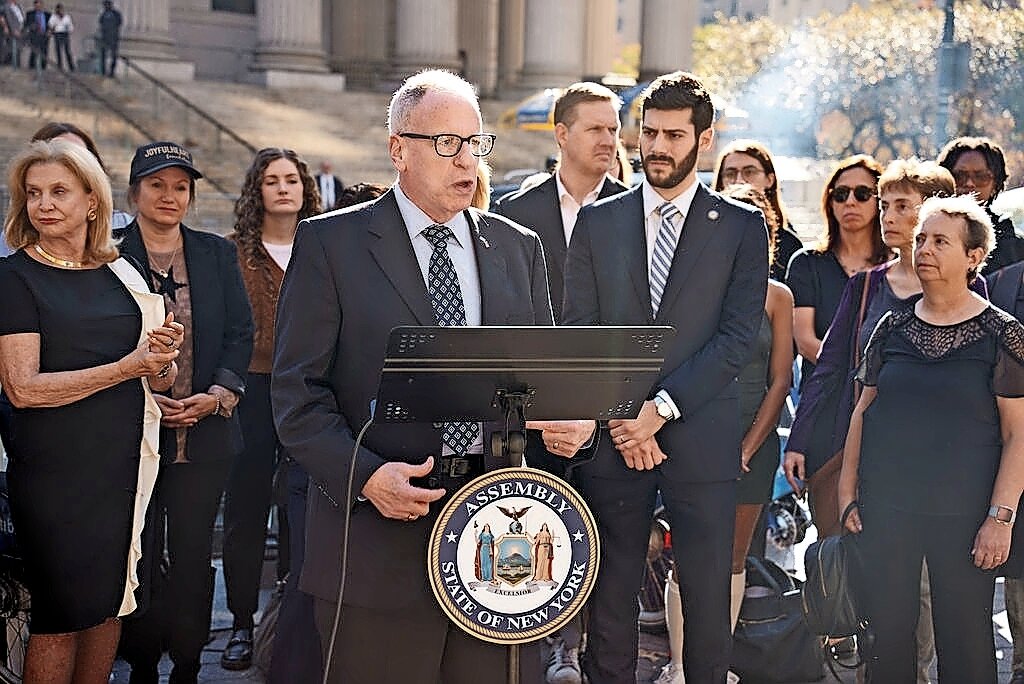Voluntary intoxication bill passes Senate
Legislation to stop an accused rapist from using a victim’s voluntary intoxication as a defense passed in the state Senate on May 14. Now the bill, sponsored by Sen. Nathalia Fernandez and Assemblyman Jeffrey Dinowitz, needs the assembly’s support before it can be delivered to Gov. Kathy Hochul.
Fernandez told The Press she was relieved to see the bill pass.
“If the survivor of rape was raped while intoxicated, while mentally incapacitated, it would remove any victim shaming, any blaming,” Fernandez said. “Because as the law is, if the person that was raped self intoxicated, they’re at fault and this would remove that.”
This is not the first time the bill has passed the senate. An iteration of the bill sponsored by Sen. Alessandra Biaggi, the bill’s original drafter, passed the senate in 2020 but failed to pass in the Assembly. In 2021, codes committee chair Dinowitz declined to bring a version of the bill up for a vote because of concerns from colleagues it wouldn’t protect those falsely accused of sexual misconduct.
In 2022, the Biaggi bill failed to pass at the end of the legislative session as a result of the language in the Assembly version and senate version not mirroring. The current version of the bill is matched.
At the time, Biaggi accused Dinowitz of purposefully changing the language of the Assembly bill so the two could not be reconciled — something the Assemblyman always denied.
Last month, Dinowitz told attendees at a Manhattan College town hall for the bill he was committed to getting the new version onto the agenda before the end of the legislative session in June.
Last week, he told The Press the bill is at the top of his list and he believes, if it makes it to the assembly floor, his colleagues will vote for it with few exceptions.
“No person should fail to get justice after having been sexually assaulted because of an omission in the law,” Dinowitz said. “And the current law with reference to the rape intoxication exclusion sets up a situation where many people do not get justice because DAs won’t bring cases, given the circumstances..”
More than 60 percent of the standing committee on codes are listed as co-sponsors to the bill. At press time, the bill has more than 65 co-sponsors from both parties, according to Dinowitz.
However, the bill was not put on the codes agenda this week.
Dinowitz said he still needs to convince some people to get on board with the bill.
“It doesn’t have all the backing that it would need to have,” he said. “I am trying to get the bill conferenced and that has not happened yet. I very much want this to happen.”
Dinowitz said opposition has typically come from defense lawyers, but also a few fellow Assembly members.
“I think that my job is to clear up some misconceptions about the bill,” Dinowitz said. “Because there are a few people who’ve said incorrectly that what this bill will allow is if somebody wakes up the next morning and says, ‘Oh my God, I wish I didn’t do that,’ (then) make a false claim of rape or something. That’s just not a thing, it doesn’t happen.”
Justice Without Exclusion, a coalition of advocates, human rights violation survivors and more than other 20 organizations, has been fighting to pass the bill in several ways, including helping to craft its language. One of those writers is Community for a Cause executive director Chris Lake.
“Unfortunately, voluntary intoxication has been proven by research to be the most likely scenario that someone is sexually assaulted in New York,” Lake said.
“We have over 6,000 reported rapes per year. Being able to provide justice to these people is what the government is committed to, it’s what the justice system is committed to, and we can’t say that just in words, it needs to be in action.”
Fourteen states have already removed the loophole in the U.S. Within the year following the strengthened law’s adoption, 11 of those states saw a drop in the rate of reporting sexual assault, Lake said. Two of the remained states did not yet have data, while in the last, reported rapes only increased less than half of 1 percent.
In the 12 states with reported data, rape dropped by a little more than 10 percent across the last 20 years, Lake said.
Lizzie Asher, co-founder of Cura Collective, said her group analyzed every word in the bill to make sure victims would not be excluded from receiving justice. She said, this week alone, they have 10 meetings lined up to recruit additional co-sponsors.
“We have been actively educating members of the Assembly on this issue, we have essentially added more than 30 co-sponsors to this bill, just through diligence and consistency and perseverance,” Asher said. “And not once have we had anybody say to us, ‘this is my problem with this bill, I will not vote on it.’”
She emphasized the importance of the bill in light of two Bronx New York Police Department officers who recently were indicted for criminal sexual acts and sexual abuse charges after allegedly engaging in sexual conduct with a heavily intoxicated woman who could barely stand up, according to District Attorney Darcel Clark.
Asher said the incident took her back to a case from 2011 in which two male Manhattan NYPD officers took an inebriated woman to her home and allegedly raped her. While both men were charged with misconduct, they were acquitted of rape.
“It just sometimes baffles me,” Asher said. “It’s almost a little sad that something horrible needs to happen to somebody.”






